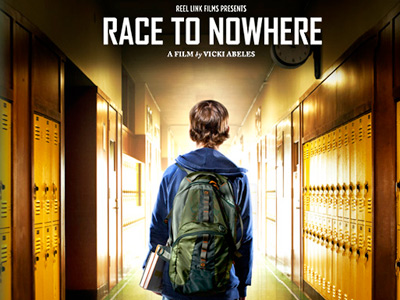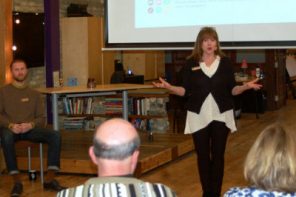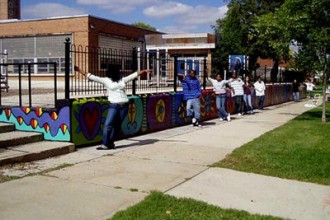While the education debate rages on in all its myriad forms, from vouchers and choice to accountability and merit pay to standardized testing and value-added measures, first-time filmmaker Vicki Abeles tells a different education story in her 85-minute documentary “Race to Nowhere.”
The film — which screens in Milwaukee at The Times Cinema on Thursday, Oct. 7 at 7 p.m. — talks to kids, their parents, their teachers, psychologists and education experts about what Abeles calls “the silent epidemic in our schools:” pressure and stress.
I can see half of you rolling your eyes and shaking your heads already. And while you may go into “Race to Nowhere” skeptical that homework, sports, music lessons, clubs, community service and all the other things that colleges look for in applicants are stressing out our kids, you might emerge from the darkness an hour and a half later with a different opinion.
The film starts with Abeles talking about her own family and how as her kids got a little older, homework, school and extracurricular activities started to literally keep her family apart.
“I really wanted to have time together and that worked out well for a few years. But as my kids got older … it became much more complicated,” she says. “I didn’t think when I had kids that the only I time would see them is for 20 minutes at dinner. In all three of my kids I started to see the toll that the schedule and the stress was taking on them.”
Abeles’ kids began to get physically ill from the stress. Then, a 13-year-old girl in their town committed suicide and it served as a real wake up call.
Abeles began interviewing kids about their homework, their schedules and the stress and pressure that they feel. There are kids that are up well past midnight doing homework and cramming for tests. They lose sleep that is important to everyone, but especially to growing adolescents, they starve themselves to help stay away and they suffer headaches, stomachaches and other issues.
Clinical psychologist Wendy Mogel says it’s all a form of child neglect. Kids are over-scheduled and tired and always looking ahead. In grade school they’re led to panic about working hard to get into a good high school. In high school they work hard to get into a good college.
Some experts interviewed point out that homework offers diminishing returns and that at some age levels there’s no correlation between homework and good grades. At other levels there’s no benefit after an hour of homework.
Denise Pope of Stanford School of Education says that many countries that have kids that outperform American kids give far less homework than American schools do.
In the end, say many of the kids, they’re not really learning anything. One boy says, I’m not thinking about what any of (the homework) means. I’m thinking about how I’m going to get it all done.” Others say the stress encourages them to cheat.
And some of their teachers and experts agree. One AP math teacher noted that when he cut the homework load on his class, grades shot up.
Ironically, “Race to Nowhere” is pretty choppy, with lots of edits early on, offering lots of quotables, but little meat. Later, when we hear from a boy named Isaiah, for example, we get some more in-depth and satisfying looks at specific kids’ stories.
Later, still, we get the full story of the death of 13-year-old Devon Marvin and it is devastating and shocking to hear.
I suspect it will be no spoiler to say that at the end of the film, Abeles offers some advice to kids, to parents, to teachers, to doctors and others on how to spot symptoms of dangerous stress on kids and how to prevent it.
Abeles and her subjects don’t suggest that kids forgo everything in favor of random play — although they do remind us that play is how children learn about the world around them — but they do urge us to put our kids’ lives into perspective. There will be plenty of time for them to be stressed out adults. They don’t need to be stressed out adults at age 10.
Admission to the Milwaukee screening — which is sponsored by Great Lakes Teacher Training, National Louis University, the Educators’ Network for Social Justice, the Institute for the Transformation of Learning, Teach Me Peace and the Community Transformation Project. — is $8.


 i evaluate to yes even if there's no image
i evaluate to yes even if there's no image  i evaluate to yes even if there's no image
i evaluate to yes even if there's no image  i evaluate to yes even if there's no image
i evaluate to yes even if there's no image  i evaluate to yes even if there's no image
i evaluate to yes even if there's no image  i evaluate to yes even if there's no image
i evaluate to yes even if there's no image  i evaluate to yes even if there's no image
i evaluate to yes even if there's no image 